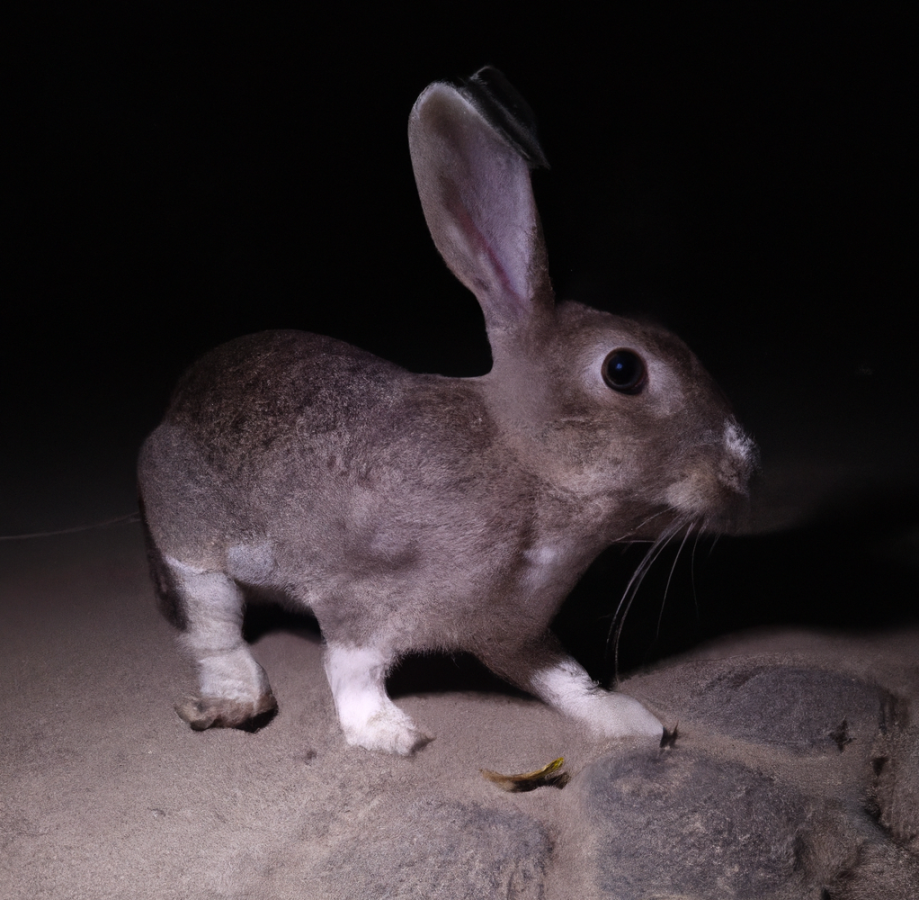Do Rabbits Get Scared of The Dark?
Rabbits are adorable and popular pets known for their soft fur, twitching noses, and cute little hops. As responsible pet owners, it is essential to understand our fluffy companions’ behaviors, needs, and fears to ensure their well-being. One common question that often arises is whether rabbits get scared of the dark. Let’s delve into this topic and shed some light on the matter.

Do Rabbits Have Poor Vision?
Contrary to popular belief, rabbits have excellent vision and can see quite well in the dark. Their eyes are specially adapted to perceive motion and distinguish objects even in dim lighting. Rabbits have a wide field of view, nearly 360 degrees, which allows them to spot potential threats or predators. Their eyes are also positioned more to the side of their heads, giving them a broader peripheral vision. These visual adaptations help rabbits survive in the wild and avoid danger, even during nighttime.
How Do Rabbits Navigate in the Dark?
Rabbits rely on several other senses in addition to their vision to navigate in the dark. Their acute hearing allows them to detect even the slightest sounds, enabling them to assess their surroundings and potential threats. Additionally, rabbits have an incredible sense of smell. They can identify familiar scents and use their noses to locate food, water, and shelter. By combining their excellent vision, hearing, and sense of smell, rabbits can navigate effectively in the dark without feeling scared or disoriented.
Do Rabbits Prefer Darkness?
Rabbits are crepuscular animals, meaning they are most active during dawn and dusk. In the wild, these periods offer rabbits optimal conditions for foraging and avoiding predators. While rabbits are not necessarily nocturnal animals, they do have a natural preference for dimmer lighting. In their burrows, rabbits create cozy and dark spaces where they feel safe and secure. However, this does not imply that rabbits are scared of bright lights or the dark. They merely seek environments that resemble their natural habitats and provide a sense of security.
Should I Keep the Lights On For My Rabbit?
It is not necessary to keep the lights on for your rabbit at all times. Like humans, rabbits need a certain amount of uninterrupted sleep. If you keep the lights on throughout the night, your rabbit may have difficulty sleeping, leading to stress and health issues. However, it is essential to provide some ambient lighting in their living area during nighttime. This can be achieved by using night lights or ensuring there is enough indirect light from nearby rooms. Providing a dimly lit environment will ensure your rabbit feels safe and comfortable without disrupting their sleep patterns.
Common Fears and How to Address Them
Loud Noises
Rabbits are prey animals, and sudden loud noises can startle them. If your rabbit gets scared by loud noises, try to minimize these disturbances. Avoid playing loud music or having loud conversations near their living area. If there are unavoidable loud noises, provide hiding spots or dens where your rabbit can retreat to feel safe and secure.
Strangers or New Environments
Rabbits are naturally cautious and may feel anxious when encountering strangers or new environments. To help your rabbit feel more at ease, introduce new people or surroundings gradually. Allow your rabbit to approach new individuals or spaces at their own pace, and always provide hiding spots where they can retreat if they feel overwhelmed.
Handling and Confinement
Sometimes, rabbits can exhibit fear or anxiety when being handled or confined. To minimize their stress, it is crucial to handle rabbits gently and properly. Always support their bodies fully and ensure you do not restrain them too tightly. Additionally, provide your rabbit with ample space to move around freely, both inside their enclosure and during supervised playtime.
Separation Anxiety
Rabbits are social animals, and being separated from their human companions or fellow rabbits can cause them distress. To alleviate separation anxiety, ensure your rabbit has plenty of toys, tunnels, and other forms of enrichment to keep them entertained and mentally stimulated when you are not around. Consider getting your rabbit a compatible companion to provide social interaction and reduce feelings of loneliness.
FAQs
1. Can rabbits see in complete darkness?
No, rabbits cannot see in complete darkness. However, their eyes are exceptionally adapted to low-light conditions, allowing them to navigate effectively even in dimly lit environments.
2. Do rabbits get scared of bright lights?
While rabbits have a natural preference for dimmer lighting, they are not scared of bright lights. However, sudden exposure to intense light may startle them momentarily.
3. Should I keep my rabbit in complete darkness during the night?
No, it is not necessary to keep your rabbit in complete darkness during the night. Providing ambient or indirect lighting will help your rabbit feel safe and secure while allowing them to maintain their natural sleep patterns.
4. Can rabbits be trained to overcome their fears?
Yes, rabbits can be trained to overcome certain fears through positive reinforcement and gradual exposure. However, it is essential to remember that each rabbit is unique, and their comfort levels may vary.
Rabbits are fascinating creatures with exceptional senses that allow them to navigate effectively in the dark. While they may have a preference for dimmer lighting, rabbits do not get scared of the dark. Providing a safe, comfortable, and appropriately lit environment is key to ensuring their well-being. Understanding and addressing their fears will help strengthen the bond between you and your beloved rabbit, creating a harmonious and stress-free living environment for both of you.
Related Articles…
Copyright Notice:
Images displayed on this website are not our property, but are procured from the internet. If you hold copyrights to any image and wish for its removal, please get in touch with us.
